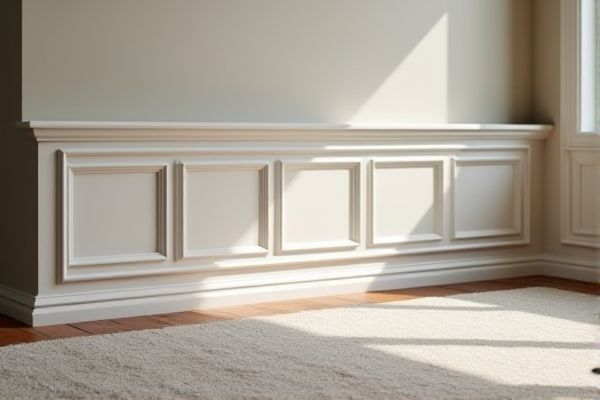
Decorative risers enhance the visual appeal of stairs with intricate designs, patterns, or colors, while plain risers maintain a simple, clean look that complements various styles. Discover which option best suits Your home's aesthetic and functionality by reading the full article.
Table of Comparison
| Feature | Decorative Risers | Plain Risers |
|---|---|---|
| Design | Ornate, patterned, or textured for visual appeal | Simple, smooth, and unembellished |
| Material | Varies: wood, tile, metal with decorative finishes | Commonly wood, metal, concrete, or basic tile |
| Cost | Higher due to design complexity and materials | Lower, budget-friendly and easy to manufacture |
| Installation | Requires precision alignment to maintain aesthetic | Simple installation with minimal alignment concerns |
| Maintenance | May need special care to preserve decorative elements | Easy to clean and maintain |
| Aesthetic Impact | Enhances staircase with style and character | Provides clean, minimalistic look |
| Use Cases | Residential homes, upscale commercial spaces | Utility areas, industrial, or budget-conscious projects |
Introduction to Stair Risers
Stair risers serve as the vertical component that connects each stair tread, crucial for both structural integrity and design aesthetics. Decorative risers feature patterns, colors, or materials that enhance visual appeal and complement interior decor, while plain risers offer a minimalist look emphasizing simplicity and functionality. Choosing between decorative and plain risers impacts the overall ambiance and style of staircases in residential or commercial spaces.
What Are Decorative Risers?
Decorative risers are specially designed stair components that enhance the aesthetic appeal of a staircase by featuring intricate patterns, textures, or colorful finishes. Unlike plain risers, which typically have a simple, unadorned surface, decorative risers act as a focal point and add character to your staircase design. Choosing decorative risers allows you to personalize your space with unique visual interest and style.
Understanding Plain Risers
Plain risers offer a clean, minimalist look that complements a variety of stair designs without drawing attention away from other architectural features. Their smooth, unadorned surfaces make them easier to paint, clean, and maintain compared to decorative risers, which often include intricate patterns or textured details. Ideal for modern or understated interiors, plain risers provide a versatile and cost-effective option for stair construction and remodeling projects.
Aesthetic Appeal: Decorative vs Plain Risers
Decorative risers enhance staircases with intricate patterns, textures, and colors, creating a visually striking focal point that complements various interior design styles. Plain risers offer a minimalist and clean look, providing versatility and a subtle backdrop that emphasizes the treads or surrounding decor. Choosing between decorative and plain risers impacts the staircase's overall aesthetic appeal, influencing whether it serves as a bold design statement or a streamlined architectural element.
Material Options for Both Types
Decorative risers are available in a variety of materials including wood, metal, glass, and acrylic, offering diverse textures and finishes to enhance aesthetic appeal. Plain risers typically utilize durable materials such as MDF, plywood, or basic hardwoods, prioritizing functionality and cost-effectiveness. Both types can be customized with paint or veneers to match specific design requirements, but decorative risers emphasize visual impact through material selection.
Installation and Maintenance
Decorative risers often require more precise installation due to intricate designs that must align perfectly with stair dimensions, whereas plain risers offer straightforward fitting with minimal adjustments. Maintenance of decorative risers includes regular cleaning to preserve detailed patterns and may involve touch-ups for painted or laminated finishes, while plain risers typically demand less upkeep, requiring only basic cleaning to maintain appearance. Choosing between decorative and plain risers impacts both labor time during installation and the frequency of maintenance efforts to sustain aesthetic quality.
Cost Comparison
Decorative risers typically cost 20-50% more than plain risers due to their intricate designs and higher-quality materials. Plain risers offer a budget-friendly option, averaging around $10 to $25 per step, making them ideal for cost-conscious projects. Your choice between decorative and plain risers significantly impacts the overall staircase renovation budget.
Durability and Longevity
Decorative risers often feature higher-quality materials and finishes that provide enhanced resistance to wear, scratches, and moisture compared to plain risers. This improved durability ensures your stairs maintain their aesthetic appeal and structural integrity for a longer time, reducing the need for frequent repairs or replacements. Choosing decorative risers can significantly enhance the longevity of your staircase while offering a visually appealing upgrade.
Best Uses in Home Design
Decorative risers enhance staircases by adding visual interest and complementing styles such as rustic, Victorian, or Mediterranean, making them ideal for entryways and living rooms where aesthetic appeal is paramount. Plain risers offer a minimalist and clean look, suited for modern or industrial interiors, and function well in high-traffic areas like kitchens and basements due to their simplicity and ease of maintenance. Choosing between decorative and plain risers depends on the desired ambiance and the overall interior design theme of the home.
Choosing the Right Riser for Your Space
Decorative risers add visual interest and can elevate the style of your staircase, making them ideal for spaces aiming for a unique or luxurious look. Plain risers offer a clean, minimalist appearance and are easier to maintain, perfect for modern or understated designs. Your choice depends on the ambiance you want to create, whether it's bold and eye-catching or simple and functional.
 homyna.com
homyna.com